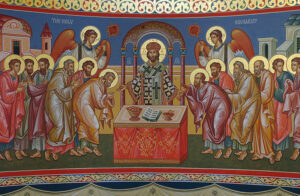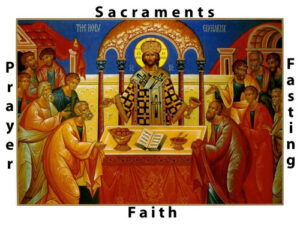
The preceding is an editorial comment.
+ + +
Now, on to today’s topic:
Making Lent Great for your Family
This article was written in 2003 by Philip Mamalakis, PhD, Assistant Professor of Pastoral Care at Holy Cross Greek Orthodox School of Theology. It is reprinted here with his permission.
Our neighbors returned from a weekend away at a resort with their two teenagers. They described to us the wonderful food buffet at the resort. The brunch buffet, they reported, had everything, the meats, the scrambled egg bar, tremendous fruit spreads, all the pancakes and toppings you could think of, ten different types of dishes, salmon, croissants, you name it, they had it. They couldn’t hold back their dismay as they told us how their two boys came back from the buffet with a bowl of Captain Crunch cereal! “They can have that at home any time,” they exclaimed. They could have anything they wanted, a feast fit for a king, and they passed it all up for a bowl of cold cereal.

For some, this is what Great Lent is like. We have this incredible banquet feast for our souls to learn, indulge, and devour. We have a tremendous spread of services, traditions, rituals, prayers, hymns, and guidelines for preparing for Christ’s resurrection, but many of us walk through and choose a bowl of cold cereal. Naturally, we will feel pretty unfulfilled if that is all we take away. How can we make Lent great for our kids and our families? Well, it is as simple, and as challenging, as learning to indulge ourselves in the Lenten buffet that God offers to nourish our souls.

Lent is a time that we are invited to change our lifestyle in preparation for Easter. Like anything else in life, the more we understand what is happening, the more we indulge in the banquet, the more we will experience God’s healing presence in our lives. I won’t be able to highlight all of the delicacies that are laid out before us during this Lenten season, so I will highlight three of the dishes that families can partake in as a way of connecting to the banquet ourselves and teaching our children to partake. Notice the first connection, though. The most effective way to teach our children the joy of the liturgical life of the Church is to embrace it in our own lives.

Make a commitment on how you will fast during Lent.
As Orthodox we fast from food to be able to fast from sin. And it is our sin that keeps us from experiencing God fully. This connection between how we eat and how we sin is what the Fathers of the Church are clear on. This connection is also something that is lost in contemporary society. In America today we don’t hear a lot about how fasting can help a marriage stay together or how a family can learn to love God through fasting. As a therapist I see marriages fail because people cannot control how they act towards each other.
Essentially the more we indulge ourselves in whatever we want, the more we become enslaved to our desires, rather than free to love. Fasting is not magic, but when we feast at the banquet for our souls through fasting we see God transforming our worldly desires towards His Kingdom. Opening up our marriages and families to fasting, opens up our hearts to be filled with the Grace of God and be truly free.
Fasting rules for families are a personal thing. Each family will do it differently. In consultation with your Priest or Spiritual Father, consider following the fasting guidelines of the Church. Consider what you did last year, and take a step further this year. For some, this might mean fasting from meat and dairy during the first and last weeks of Lent. For others, it is time to fast from dairy products during every week of Lent, or on Wednesdays and Fridays. Learning to partake of fasting from the buffet of the Church during Lent means letting go of control of our diet and giving this to God. Fasting is not just about food, but also about healing our souls. It is a challenge for us today, but like any sacrifices we make in faith, God’s blessings that come from it are uncountable.

Make a commitment to a Church Schedule during Lent
..During Lent, the Church offers more opportunities for us to come together in prayer. When we make any efforts to re-orient our lives towards God, we will be challenged. The Church knows this and provides opportunities for us to strengthen ourselves for this effort through prayer. The church services are for us to be encouraged and strengthened.
Before Lent starts, decide as a family what your church service schedule will be. Families do this all the time at the beginning of the soccer, football, or basketball season. Families look ahead to commit their evenings and weekends to the sport schedule. The coach demands it and families do this. We do this for earthly rewards: a championship team or to help our kids develop their sports skills. Planning in advance that you will go to every Wednesday night Pre-Sanctified service, or Friday night Salutations service, or maybe Saturday night Vespers is a commitment towards heavenly rewards of peace and healing. Planning ahead what services you will commit to is a way of setting our family’s Lenten journey within the life of the parish; right where it belongs.
Now what should we do if our kids don’t want to go? Or maybe we have mixed feelings about going. Attending the services requires a commitment of our time that will pay off in transforming our hearts and lives towards receiving God’s Grace. God’s Grace heals the ills of our souls. But services don’t have to be boring. Spend time as a family to make it meaningful. Learn about the service. Ask your Priest to teach what is happening and why. Participate in the services by learning the hymns and prayers. Suggest coordinating a potluck or discussion group at Church after service for families. This could mean coordinating activities for kids and discussion for adults. Do a family activity following the service that everyone will enjoy, like a family night at home. Like many good things in life, until we learn to love the medicine of worship in our lives, a teaspoon of sugar helps it go down. There are few things as boring as an Orthodox Church service that you are not connected with and there is nothing more transforming than living a life of worship.

Make a commitment to family prayer at home during Lent
Kids are more likely to feel at home at church if their home feels more like a church. While I am not suggesting that we walk slowly and use quiet voices at home, Lent is a great time to build your family icon corner, or come together before your icon corner in prayer. Mom and dad must be taking things seriously if they are lighting a candle before the icons and bowing their heads in prayer. If we are singing Church hymns at home, our kids will feel a familiarity when the hymns are sung at Church. Lent is a time to consider coming together as a family before the icons instead of before the television. If you don’t think you know how to do this, talk to your Priest about how to start to pray or find people to teach you about this.
Consider specifically incorporating the Lenten Prayer of Saint Ephraim as a family. Each evening, following dinner, or before bedtime when everyone is together, gather at the family icon corner and say the prayer all together.
O Lord and Master of my life, give me not the spirit of sloth, despair, lust for power, and idle talk. (prostration)
But give me rather the spirit of moderation, humility, patience, and love to thy servant . (prostration)
Yea, O Lord and King, grant me to see my own transgressions and not to judge my brother, for blessed art Thou unto the ages of ages. Amen (prostration)
After each verse, do a full prostration, or bow, in front of the icon of Christ.
This is the same prostration the Priest does at the beginning of services. Nothing shifts a family prayer time like doing prostrations together. Christ is present as we gather, and through the icons. Bowing down to Him makes it real and requires a step in faith. Paradoxically, it strengthens our faith, which is what we need as we try to turn our lives towards Him.

So the Lenten buffet is laid out before us to nourish our souls and prepare us to receive Christ at Easter. We can partake of fasting, church services, and prayer in the home. I have not mentioned many of the other ‘dishes’ available like confession, forgiveness, almsgiving, reading the scriptures, pilgrimages, reading the lives of the Saints, or memorizing scripture or prayers. The banquet is set for us to partake as much as we desire.
The goal or purpose of Lent is not to fast or pray. The goal of Lent is to experience God directly. Helping our kids ‘get more out of Church’ means helping them experience God directly. Lent is a time for families to reorient ourselves towards God, but it takes a commitment to open our families to the life in Christ and open our homes to God’s saving Grace. The feast is there for us to partake of, but we can also walk right by, grabbing a bowl of cold cereal. Remember, though, that after a bowl of cereal you will be hungry again in an hour. But God promises those who partake, that “Blessed are those who hunger and thirst after righteousness, for they shall be filled.”
+ + +
 Philip Mamalakis is a native of Milwaukee, Wisconsin. He holds a B.S. degree from the University of Wisconsin- Madison, an MDiv from Holy Cross Greek School of Theology, and a PhD from Purdue University.
Philip Mamalakis is a native of Milwaukee, Wisconsin. He holds a B.S. degree from the University of Wisconsin- Madison, an MDiv from Holy Cross Greek School of Theology, and a PhD from Purdue University.
At Holy Cross Seminary, in Brookline, Massachusetts, he teaches the two core courses in Pastoral Care in addition to electives in pastoral counseling, grief, death and dying, marriage and family, and pastoral care and mental health. His professional interests are in Orthodox pastoral care for marriage and family, and the interface between contemporary mental health research, theory and practice and Orthodox theology. He has published articles on a number of topics including Orthodox marriage and marital counseling, therapists in congregations, working with couples recovering from infidelity, domestic violence, and the role of the therapist in pastoral care.
He is the author of Ancient Faith Publishing’s best selling Orthodox parenting book, “Parenting Toward the Kingdom” (2016) which has been translated into Greek, Russian, Romanian, Estonian, and German. He has published, with Father Charles Joanides, a new edition of the marriage preparation program for the Greek Orthodox Archdiocese, “The Journey of Marriage”, (GOA, 2022). . He is a sought after speaker and guest on podcasts and offers retreats and seminars on a wide variety of topics related to Orthodoxy and pastoral care, mental health, clergy wellness, counseling, marriage and family life, and relationships.
He is the founding Vice-Chair of the Assembly of Canonical Orthodox Bishops of America’s Mental Health Task Force and mental health ministries and the former President of the Orthodox Christian Association of Medicine, Psychology, and Religion (OCAMPR.org)
He and his wife Georgia live near Boston, not far from Holy Cross. They are parents of seven children, some now grown with children of their own.
May I add a personal note: Philip is a really nice guy.
Next Week: The Church’s Last Minute Instructions as we go into Lent.
Beginning Week after Next: Beginning of a series on Saints we almost miss because their feast days fall during Lent.